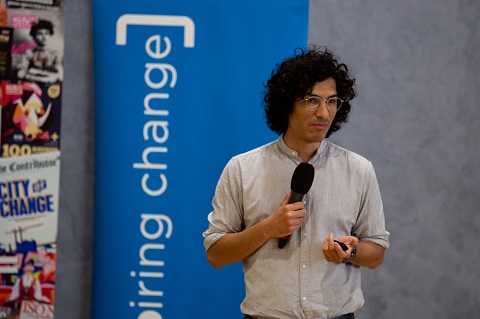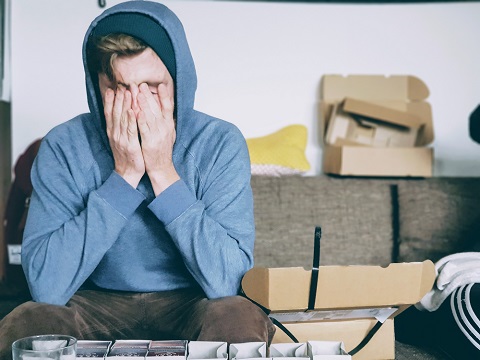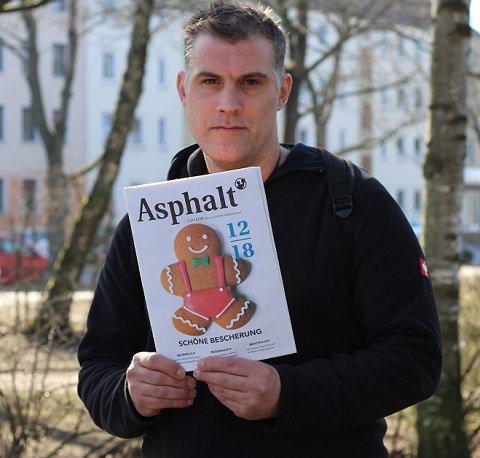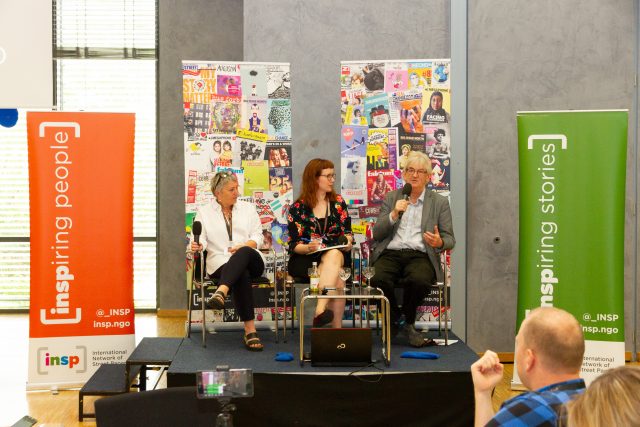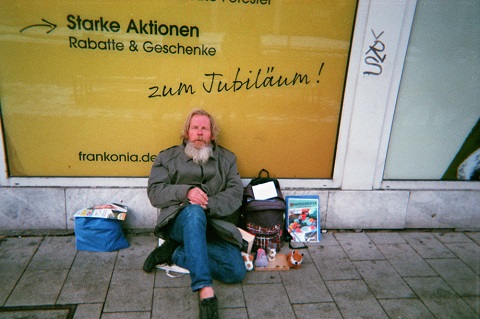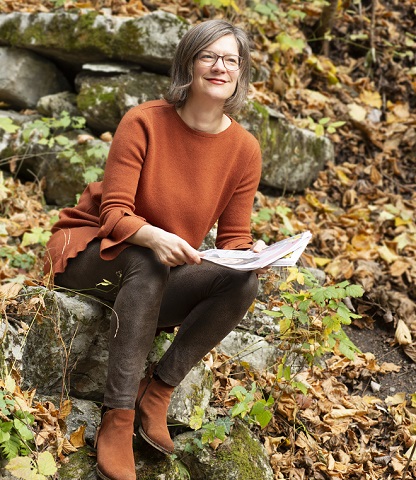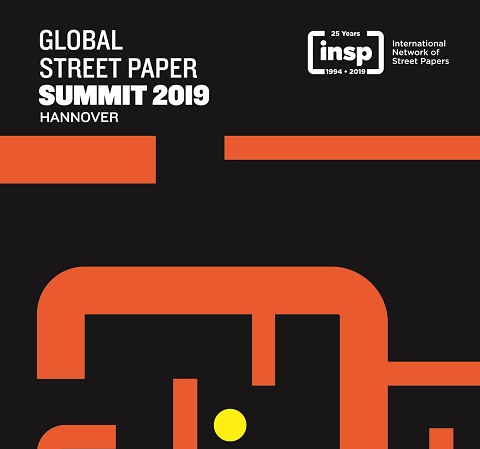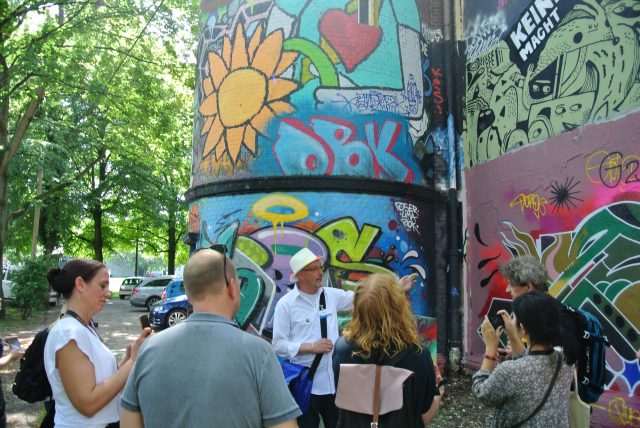It’s an experience that beer lovers, and drinkers everywhere, will find familiar after a night out of a few too many: you wake up the next morning, head thumping, all you can taste is the inside of your own mouth, hungover and parched. You stumble to the kitchen, grab the first cup-shaped container you spot through your barely opened eyelids, run the tap, fill the glass and gulp till you feel better. The water you drink is cold, clean, available – something we all take for granted.
But being able to rehydrate after going overboard at the pub is a luxury that gives pause when there are hundreds of millions of people across the world who can’t even access safe drinking water when they’re thirsty. It’s an obvious, but extremely complicated, problem, and it’s the impetus behind Edinburgh-based social enterprise Brewgooder, a craft beer with a difference.
“What makes us unusual is that we are on a bit of a mission – there’s a purpose behind us selling beer, other than to just bring people really good beer, and that’s to unlock clean water for a million people,” says the company’s founder Alan Mahon. Just over two years ago, on World Water Day (22 March) 2016, Brewgooder went from being an idea to a real, but fledgling, business, one that invests 100 per cent of its profits into meeting that, inarguably ambitious as Mahon admits, target. “So that might be in terms of funding clean water projects out in the field or, back at home, growing the team, to grow sales, in order to make sure the return is sustainable going forward,” he explains.
After an initial crowdfund of £60,000 kick-started production of what would become known as Brewgooder’s flagship drink, ‘Clean Water Lager’, the company now employs six UK-based staff, as well as supporting some of the jobs at their brewing partners, who produce the beer at zero margin.
“This allowed us to scale up quite considerably. In theory, we can to continue to grow our sales which will then lead to more profits without having to invest in our own brewing capacity,” he says. “I think that’s quite important to point out – if we were constantly promising to deliver greater social impact, but were continuously having to buy bigger and better kit as we grew, I think that would actually slow down and erode a bit of confidence in our drinkers. So, we made sure when we were designing the company that we had that in mind.”
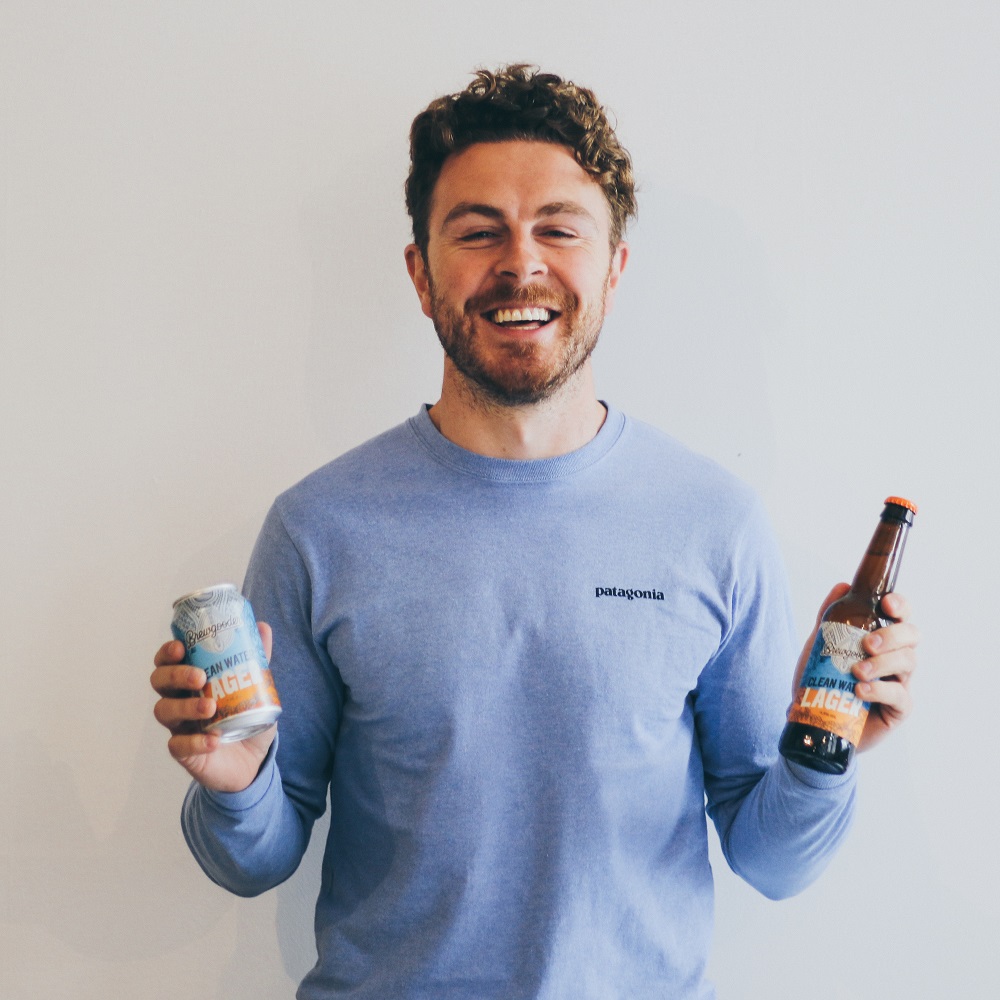
By the midway point of 2018, Brewgooder had funded or co-funded 65 different projects in Malawi, a country that has always had inextricable links to Scotland, after famed Scots missionary and explorer David Livingstone travelled there in the mid-19th century (its second largest city, Blantyre, is named after Livingstone’s hometown in South Lanarkshire). Over the years, religious and charitable groups have continued to have close ties with the southeast African nation, which is among the world’s least developed. “We originally thought we’d base projects all over – Sierra Leone, Rwanda, Costa Rica – but when we centred on Malawi, we thought, why don’t we just focus our efforts here, rather than spread our resources thin just for the PR benefit of doing work in all these various places. We’ve been back to Malawi four times now. It’s a great country and, for a multitude of reasons, people there are really poor. But those people are no less worthy of our time than people here at home. The Scottish link is just serendipitous, but that has made our ability to transform communities there that much more powerful.”
As a result of these projects, it is estimated that Brewgooder has helped around 40,000 people access clean drinking water.
When Mahon, 28, who is originally from Ballycastle, Northern Ireland, speaks to me at Brewgooder’s headquarters in Leith, ahead of the Social Enterprise World Forum (SEWF), coming to the Scottish capital in September, at which he will share his know-how on innovative social enterprise approaches to reducing poverty and inequality, he rebuffs my initial question of “why beer?” with another: “why water?”
“When I was 21, I was working in Nepal for three months and, towards the end of that trip I got sick by being exposed to water that wasn’t safe for drinking,” he answers. “I picked up a parasite. I didn’t realise that was why I was getting sick on the project, I just put that down to being in Kathmandu drinking cheap whiskey. But when I got back it started to get progressively worse, and it wasn’t a pleasant experience at all. I went to the doctor, got given metronidazole [a common antibiotic], and the parasite was killed. I was absolutely fine.
“I started thinking about water, thinking about it as a resource that we have to preserve in Scotland and became very conscious of making sure I never ran the tap and that kind of stuff. But I quickly realised that wasn’t really the issue. One of my friends was studying and was talking to me about water scarcity in various different places, and I came to realise what a massive problem it is.”
Mahon threw himself into learning more about the problem, quickly becoming passionate about clear injustices – over 800 million people across the world, and counting, lack clean water access, while around two billion have no access to proper sanitation. “I thought, I happen to be lucky enough just to be born in a society where you have access to the NHS. I was a student and I’d never paid a single dime to it but I could benefit from that. But then there are people who are my age or younger who didn’t ask to be born where they were born, are making the best of the lives they’ve been handed, and are at risk of having their dreams, ambitions, education, and achievements held back, in the best circumstances, and, in the worst, dying from something that they can’t go without.”
After graduating from university and being rejected at the final hurdle for the UK’s Department of International Development graduate scheme, Mahon admits that he was feeling disappointed and desperate for a job, until he started working in a sandwich shop. That’s not everyone’s idea of the dream career, but when said sandwich shop is Social Bite, a social enterprise café that employs and feeds people experiencing homelessness on a daily basis, Mahon began to feel the spark that, with Social Bite founder Josh Littlejohn’s help, developed into Brewgooder. “When I started working there, I realised that you could do the whole helping people thing, which was something I’d always been brought up to do, at the same time as building a business, and having a brand, and managing how things look and feel. It was a project with which you were getting the best of both worlds. It gave me the opportunity to get in that space.”
After meeting with Mahon, it makes my “why beer?” opening gambit moot. He shares the same characteristics of countless young people that are the same age as he was when the concept for Brewgooder took root: an enjoyment of going out, drinking with friends, and treating yourself to nice things within a budget. It just so happened that Mahon realised that he could combine those millennial traits with another – the desire to do good in the world.
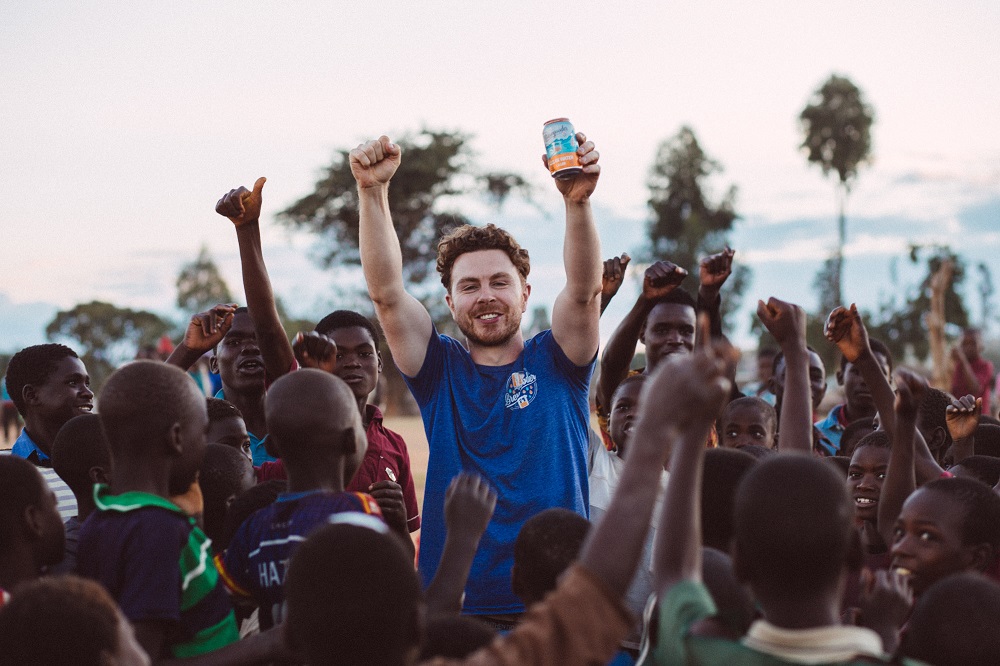
“At the same time as I was thinking about and acting on all of this, I was a young guy, with a bit of disposable income which I was spending on stuff that I liked, and that was usually good coffee and good beer,” he says. “My friends, and other people like us, were super engaged in that world – ‘oh, have you tasted this, have you heard about this brewery’ – but there was nothing that was social, from my point of view, and I just saw this massive gap in the market.
“If you could drink a beer and help other people, it could potentially be the most powerful social force in the world. Because people drink it all the time. And something else that excited me about beer was that it was democratic – it wasn’t like wine or champagne, something high end. You could go for a pint of lager, and it was accessible. For me, whether it’s beer or something easily sourced on the high street or whatever, it was like you were making philanthropy accessible for people – they could just be a part of something big without having to be another Bill Gates.”
But, the reality is, to perk the interest of those people, to have them want to buy a beer that makes a social impact, rather than just one that quenches your thirst and gets you drunk, the product itself has to be good. The resulting beer, ‘Clean Water Lager’, is a 4.5 per cent session lager, with magnum and sorachi ace. It has a bitter, lemony foretaste, with a very clean yeast profile (Mahon’s words not mine). It really is quite delicious, the kind of beer that tastes like something different, without feeling that it’s a struggle to get down. In fact, it goes down pretty easily (my words, not his).
“People ask if we get the name because we use cleaner water in the brewing process, they think they can taste it. Well, it has nothing to do with that. But it has a very clean taste profile and then it has a dill, coconut, popcorny taste at the end from the malts that really tie it together,” Mahon describes, my mouth-watering, only to remind myself that it’s not long after 9am.
“Business has grown 200 per cent over the last year and I think that shows – people like it, and are returning to it. It really makes me feel good when people say ‘Oh, I had it in this place on draught, and then saw it in the supermarket and cleared it off the shelf’. It’s certainly a better tasting lager than most of those on the market; it’s only lightly carbonated, so it doesn’t make you feel gassy, and it’s just made with good stuff, rather than syrups.
“Nothing infuriates me more than when people drink Corona, which is basically like the beer equivalent of a skoosh gun in a cinema. Any beer that’s put in a clear glass bottle – that’s how hops die, by sunlight. They just don’t give a fuck. They’ve got into this zone, and we want to replace them, saying to people ‘you’ve already decided not to drink Carling or whatever, or one of those fake Italian brands like Peroni. Why not actually go and choose one that’s better than those and do something that’s cool and helps people at the same time?’.”
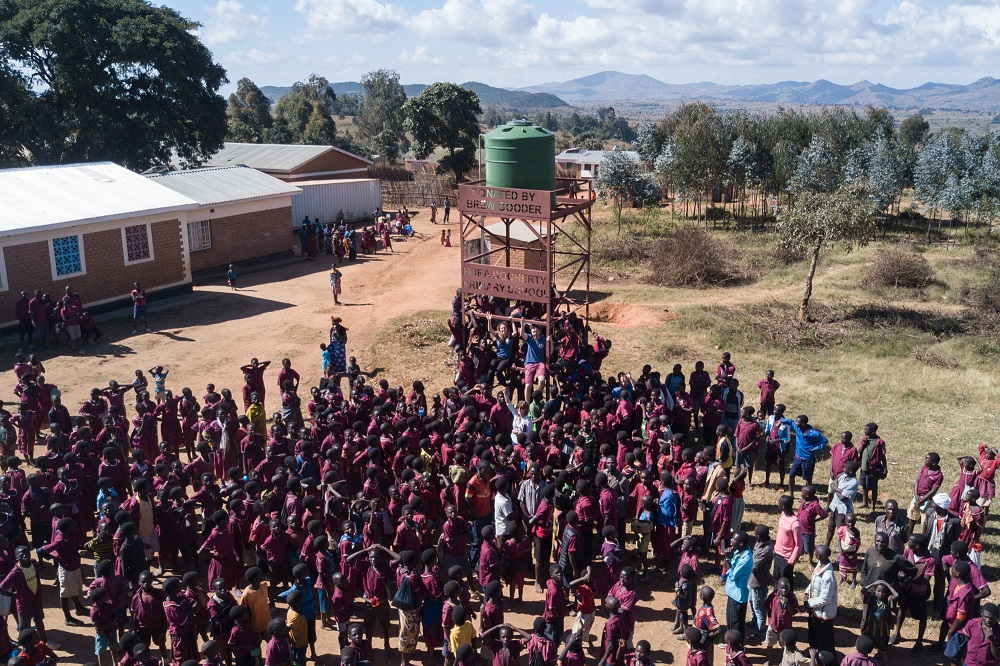
With the punny name and the instantly recognisable branding and tagline – “Drink Beer, Give Water” – Brewgooder has quickly become part of the zeitgeist, at least in its home of Scotland. Getting this right is part of how Mahon has got beer drinkers to actually care – not everyone grabbing cans from the local supermarket, or a pint from the pub, makes the immediate jump from beer to clean water, and eliciting the conscience of the slightly, or in some cases extremely, inebriated seems like a difficult task.
“You definitely don’t want anyone to buy and drink it out of duty or guilt,” he admits. “You have to make something that people want to drink. It’s a fact. Craft beer is a bit of an anomaly as it has become associated with ‘coolness’ and being a ‘hipster’, but, in Scotland, people drink lager and ultimately we want to make something people like and is cool. You need something that, from a consumer’s point of view, they desire. Then you do the added social good bit that makes you stand out.
“There are other companies that are very successful at having purpose in their business and stand out aesthetically at the same time. Some of that might not be philanthropic, it might be environmental, like [clothing brand] Patagonia, but they’re inspiring cause they’re making it, they’re doing it and they’re cool. We live in a fickle world. If a business with a purpose like this doesn’t get cool quickly, then unfortunately, they’ll just go away.”
While always an enterprising individual as a young man, it’s clear that picking up that parasite in Nepal, and landing a role with Social Bite, fundamentally changed his path. “I didn’t really get exposed to the idea of social business until I started working with Social Bite, seeing the potential of it. I was always a bit of a wheeler dealer type in school, bringing in food that the canteen didn’t have and selling it on to my mates – it was all a bit of fun. But I quite liked that process; with business you can strategise and grow, and start to see the returns. It was the perfect marriage of my values with my talents. And we’re trying to pioneer different ways of doing it.
“Hopefully, we also inspire other people to think ‘well if the guys at Brewgooder can do this social business thing, then why can’t we do something that is, probably, better’.”
The idea that Brewgooder, and social businesses like it, can inspire others, especially in Scotland, to come up with new and innovative approaches is a pertinent one thanks to the social climate in the country. Scotland has become enthralled with the phenomenon of social enterprise, with countless popping up in recent years and contributing to what is becoming a vibrant and diverse ecosystem. “I think Scotland has its own moral culture – we’ve got a greater egalitarianism within Scotland. You have this spirit of helping other people built in to how people act in the public world and business. And that has come full circle, in the sense that people who are then starting businesses, realise they can integrate what they feel into their business model.”
Mahon thinks that the rise in popularity and understanding of social enterprise is also down to the younger generations of people more susceptible to the notion of what a social enterprise is. He’s also not afraid to make clear that it’s not exactly an easy-going life, even if it is a rewarding one. “Entrepreneurship is sexy at the moment. Everyone wants to be an entrepreneur, or ‘wantrepreneurs’,” he says. “For what reason I don’t know, because it is fucking stressful. It really is. Especially if you’re starting to take on more staff, making sure they get paid, and that’s before you even worry about doing all the good impact stuff. Perhaps social entrepreneurship is booming because of the generation of people that have grown up with the internet, that have grown up with an activist sensibility, and think ‘I have more things than just buying a yacht to motivate me’.
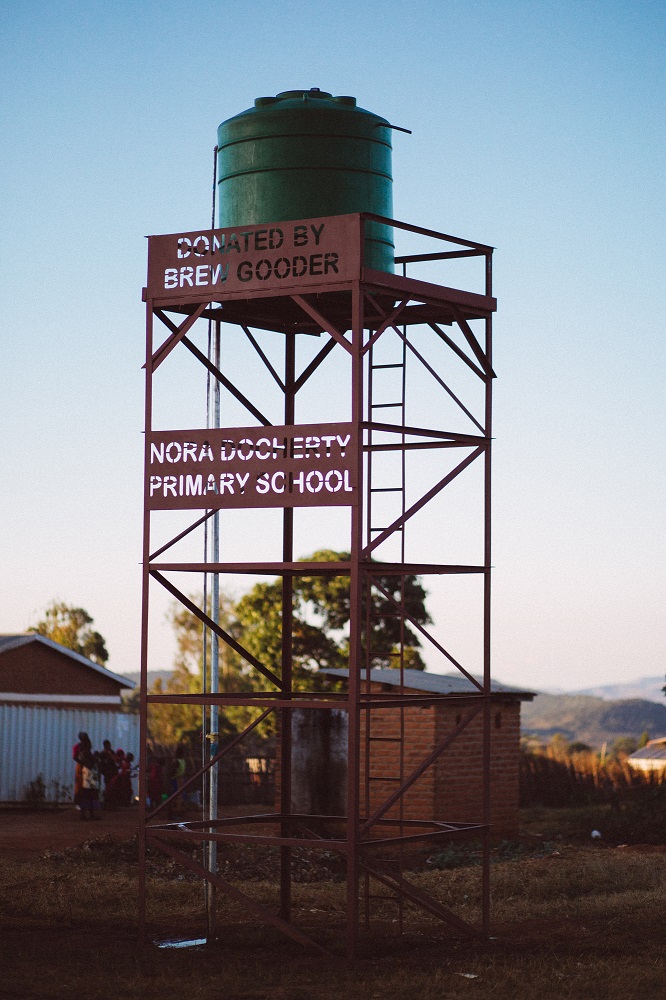
“We have technology, we have history to look back on, we’ve got values, we’re aware, we can share information better and more efficiently. There’s never been a better time to be an entrepreneur, to try new ideas, and disrupt the flow of things and that tends to be rewarded, whether that be financially, or in our case, in terms of impact, and that’s constantly evolving.
“I know Brewgooder will be looked back on as a dinosaur in ten years, in terms of how we got to do what we did, but hopefully we’ll innovate and bring more people into line with that mission, and make it so that people don’t constantly ask ‘well, if you’re giving away all your money, how do you survive’, which I get all the time. Profit always goes somewhere; it’s just in our case it’s going to a million shareholders who are people without water, instead of going to five or six people who each have ten houses.”
If Scotland has been a breeding ground for imaginative social businesses in recent times, it has also found to be a stable home for one of its oldest: INSP’s very own The Big Issue. After his experiences working with Social Bite and being involved in the fight to end homelessness longer even than his quest to bring a million people clean water, Mahon acknowledges that the street paper is an inspiration to look up to.
“The Big Issue is huge because as I’ve grown up, it’s always been there,” he says. “I never saw it when it was functioning from its humble roots; it’s just seemed to be doing wonderful work my entire life. And now, it’s also doing work that’s fostering others to do good stuff, which is the most important thing. It has that multifaceted impact. A lot of those we work with at Social Bite have been, at one point, Big Issue vendors, and I think to be able to develop people’s confidence and skills, integrate them into society again, and to make them entrepreneurs as well is fantastic. Telling people you value them, that you love them, things they might never have been told in their lives growing up, it starts to change how people think.
“The Big Issue planted the seed that contributed to the general public becoming more used to the idea of socially-minded businesses. It’s an attrition process where people reduce their barriers psychologically to being able to imagine a world where these businesses exist.”
And now, with the socially-fertile soil of Scotland an appealing environment to these organisations, the SEWF comes to Edinburgh, which Mahon says is appropriate. The conference will give Mahon, and other fellow social entrepreneurs, an opportunity to bring their vision to an even wider audience, and hopefully find other individuals passionate about his mission to use beer to help provide clean water to those who are in need. “We’re miles away from the target we’ve set ourselves, but the million people isn’t the target we’re going for right now, in a pragmatic sense. Half a million is realistic for the moment, and if you hit that, then the other half a million will come. We’re getting there, and I’m confident we’ll go all the way. We’re confounding expectations and hopefully we get to a position where you want, not only to drink our beer, but also be a part of our movement.”
INSP Members can download this article from the INSP News Service here.







